ZigBee Wireless Interfaces and Modules
ZigBee wireless is the ideal solution for creating flexible and robust networks for control and monitoring applications. Kanda sell a range of Sena ZigBee products that make it easy to create a wireless network from scratch or with sensors from other manufacturers.
What is a ZigBee Wireless Network?
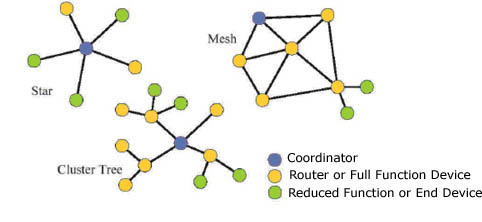
ZigBee networks can be cluster, star or mesh networks as shown in the diagram. Each network has one device that is setup as a coordinator that controls and initialises the network. Other devices can either be setup as routers that can pass data or as End Points, that can only have one connection. End points or Reduced Function Devices can be set to sleep mode so they use very little power and so can be battery operated.
Because of this very low power requirement, it is ideal for sensor networks or other control applications, which require:
- Low to medium data rates
- Lots of nodes (up to 65,565)
- Easy addition or removal of nodes from network
- robust mesh network that doesn't fall over if one node fails
- very low power, battery operated equipment
- Long range
The management software that comes with all Sena products makes it very easy to setup the coordinator, routers and end points to create the network. Most users use a USB dongle as the Coordinator and either serial adapters or embedded modules as routers or end points but all can easily be configured by you to be different types.
Any product from other manufacturers can be used with these Sena units providing they conform to IEEE 802.15.4 standard. This means that a ZU-10 USB adapter can be used as a network coordinator for a huge range of sensors and control units and provide a PC interface at the same time.
Instant ZigBee Network Control
The ZU10 series are USB products that can create a wireless network linked to a PC. They are extremely flexible and can be set up very easily to be the network coordinator with other units forming the rest of the network. These can be
- ZS10 serial adapters for wireless enabling units with serial ports
- ZE10 embedded modules for creating your own sensors or control unit
- Sensors and units from other manufacturers
ZS10 serial adapters can also be set as a network coordinator if that suits your requirements better. All Sena units come with easy to use control and setup software to create your network.
ZU10 USB to ZigBee Product
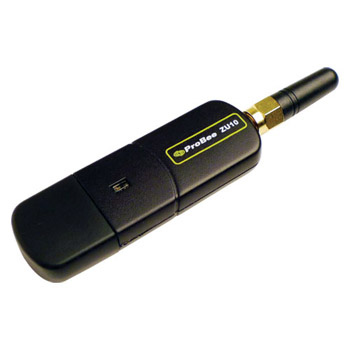 |
 |
ZS10 Serial to ZigBee Product
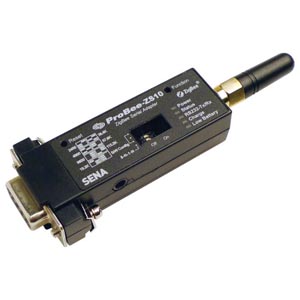 |
 |
The combination of these two products gives you a network with ranges up to 1.5KM. You do not need to understand ZigBee or wireless and you don't need to modify your existing equipment. With setup and management via Windows Management Software, Telnet or a Terminal Program, you have all the flexibility you need.
Embedded ZigBee to Serial Modules
Sena embedded modules are the best products on the market. They have built-in RS232, ADC and General I/O interfaces. This means you can use them to create a wide range of sensors and controllers. They are supplied with an on-board chip antenna or with external antenna connectors. Alternative antennas are available to give up to 1.5Km range.
A Starter kit is available to get you going with the modules.
| Embedded ZigBee modules | 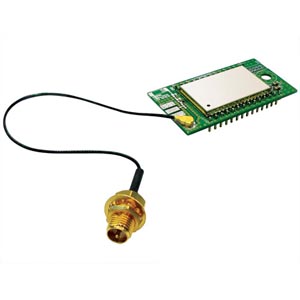 |
 |
| Starter Kit for Embedded Modules | 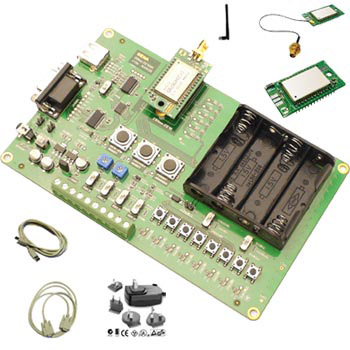 |
 |
Smart Metering and Home Automation
Recently, the standard ZigBee protocol has been extended with new application layers. The two common ones are for home automation and smart meters. Home Automation profile supports combined interface, door lock and light ON/OFF. Most products that use wireless interface now use this home automation profile. The Smart Energy profile includes Energy Service Interface, In-Premises Display and Metering Device, which are used for energy use management and smart metering.These ZigBee extensions are not supported by Sena's standa Z10 range but are supported by the new ZE20 embedded modules. There is a starter kit available to get you going with these new modules ZigBee Home Automation Starter Kit
Other Wireless Solutions
Kanda have alternatives to Bluetooth wireless. If you are not sure which wireless solution is best for your application, here is a comparison chart giving the features of three common wireless protocols.ZigBee
Wi-Fi
Bluetooth
Application
Monitoring and Control
Email, Web, Video
Cable replacement
Physical/ MAC layers
IEEE 802.15.4
IEEE 802.11
IEEE 802.15.1
Data Rate
250 Kbits/s
11 & 54 Mbits/sec
1 Mbits/s
Range
10-100 meters
50-100 meters
10 meters
Networking Topology
Mesh
Point to hub
Ad-hoc, very small networks
Operating Frequency
2.4 GHz
2.4 and 5 GHz
2.4 GHz
Complexity (Device and application impact)
Low
High
High
Power Consumption
low
High
Medium
Number of devices for Network
64K
32 per access point
7
Network Latency New slave enumeration
30 ms
-
20 sec
Network Latency
Join an existing network in <30ms
Connection 3-5 seconds
Connection up to 10 seconds
Typical Applications
Industrial control and monitoring, sensors
Wireless LAN connectivity
Wireless connectivity between devices


